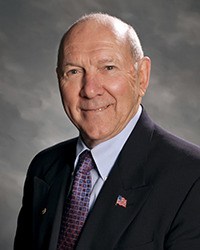Bill Peloza described standing at the Auburn International Farmers Market one afternoon and counting 128 black, bullet-shaped oil cars pass on the BNSF tracks a little more than 25 yards away.
Then on June 3 his distress at the news of a 100-car oil train that had derailed in the Columbia Gorge near Mosier, Ore., burning four of the 16 cars that jumped the Union Pacific tracks, every car full of highly flammable, Bakken crude oil, requiring the evacuation of about a quarter of the tiny city’s residents.
On Peloza’s mind: it could happen here.
After all, every day mile-long behemoths pulling cars freighted with millions of gallons of volatile shale oil from the fields of North Dakota, Colorado and Wyoming rumble over the tracks through Auburn and other cities of King County on their way to refineries up north.
Which is why at Monday’s City Council study session, dusting off a resolution relating to oil trains City leaders had adopted on April 1, 2014, Peloza suggested toughening it up with a bit of “new verbiage.”
That is, by calling for:
• Slower speeds through communities, and
• Improved tanker specifications for the transportation of hazardous materials.
“We need to stay vigilant and keep the pressure on the carriers who transport hazardous materials through the heart of our city and keep pressure on the federal department of transportation,” Peloza said.
Newspaper editorials in 2014 first prompted Peloza to start talking out about possible effects of the trains on public safety, water resources, the environment, the economy and traffic.
In the 2014 resolution, following the lead of other cities such as Spokane, City leaders asked that agencies conducting environmental reviews study issues outlined and ask that Auburn, “be included in any environmental impact statements related to any project that may cause an increase in oil rail traffic through Auburn.”
In that document, City leaders also urged that the federal government immediately implement safety regulations affecting older tank cars, train speeds and other identified hazards associated with flammable crude oil.
While the odds of a derailment or explosion in Auburn, emergency personnel familiar with the issue have said, are about equal to those of a person winning the Powerball, as singer Elvis Costello famously noted, “accidents will happen.”
“The train in Mosier was traveling 26 miles an hour,” Peloza said, noting that the rupturing of a single bolt had caused the derailment. “A couple weeks ago in front of City Hall I watched the tankers go by at maybe 10 miles an hour. But that is not in the regulations – yet. And so that’s why I inserted this, to make sure that we keep up the pressure on these two concerns – slower speeds and the tanker specification improvements. They’re in the federal government discussion, but they are looking at 2025 to have the tankers all outfitted with new valves and those sorts of things.
“So this is a small feature that we can add to this resolution, get it circulated out, and maybe get more emphasis on speed and tanker enhancements,” Peloza added
Councilman Rich Wagner, an engineer, offered another idea.
“I’d like to add … the words, ‘and improved track integrity inspections.’ Because I know the technology is out there – I’ve used it myself – to use ultrasonics to figure out whether a piece of metal has integrity or not. And I know the railroad would have to hire a lot of guys to walk around with those sensors on every bolt, but they ought to start doing it,” Wagner said.
“It’s about time that we take more stringent action on this,” said Councilman Claude DaCorsi. “When this incident (near Mosier) occurred, and they held up the bolt and said, ‘Here’s the problem,’ my thought as I saw those 16 cars was, what if this happened in downtown Auburn? This would be a catastrophe. And whether they are going 26 miles or 5 miles an hour, a defective bolt is probably going to have some impact on the trains and perhaps cause a derailment.
“… I also think that we need to put some pressure on our congressional delegation related to the tank cars, because almost two years ago we had a presentation from BNSF that said, ‘We’re going out to bid (on new cars),’ and we’ve heard nothing. So we still have the same situation. … I just don’t believe we have a railroad that is really moving forward in a fashion that gets the communities, including Auburn, where we need to be,” DaCorsi said.


